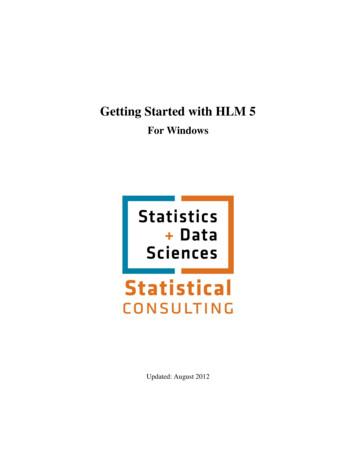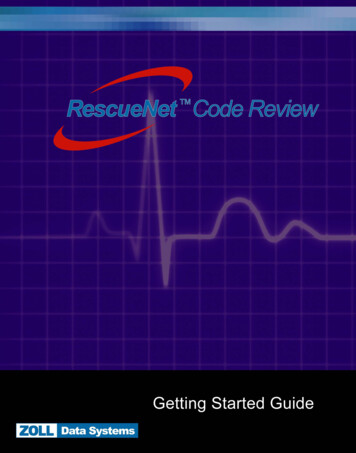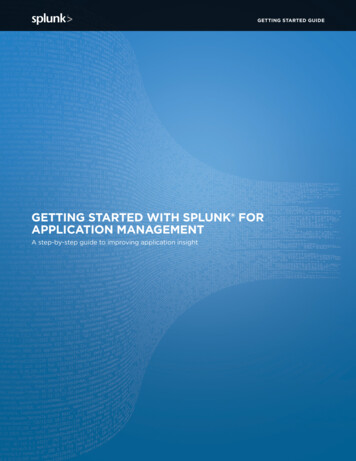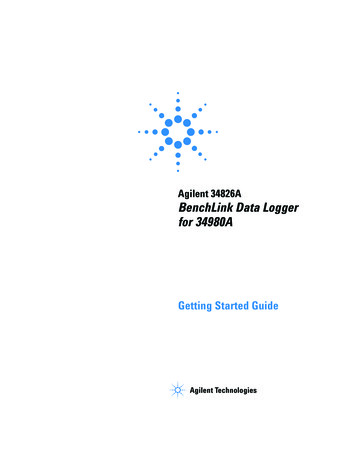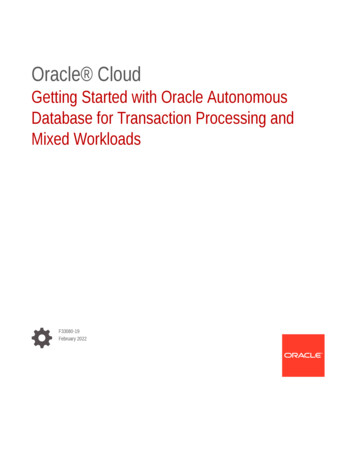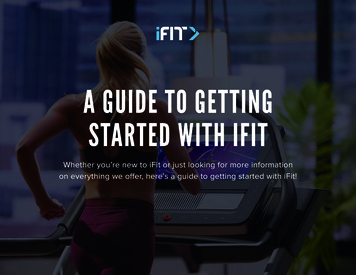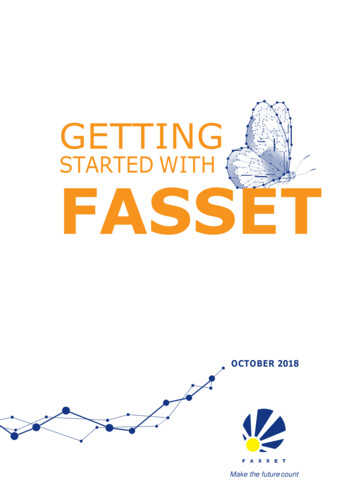
Transcription
GETTINGSTARTED WITHFASSETOCTOBER 2018Make the future count
CONTENTS1.What is Fasset?22.Where does Fasset get its income43.How do I find out if I am registered for the SDL?44.What process do I follow if I am exempt from paying SDL?45.To which Seta is my SDL going?56.What do I do if I am registered with the incorrect Seta?57.What is the process for obtaining a refund on the SDL?68.What grants does Fasset offer?68.1Learner Employment Grant (LEG)68.2Bursary Grant78.3National Student Financial Aid Scheme Grant (NRLG)78.4Non Learner Employment Grant89.What is a learnership810.How do I register for a Learnership Agreement with Fasset?811.Learnership Tax Deductions912.Internship Accreditation913.Learning Programmes Matrix1014.What is a skills Development Facilitator 1115.What happens with unclaimed levies?1116.Discretionary Grant – Projects1117.How do I attend Fasset’s free training events?1318.What are scarce and critical skills1419.Current scarce skills1420.Addressing scarce skills with learnerships1421.What learnerships does Fasset offer?1522.Learnership Agreement Process1823.Assessor and moderator registration1924.Verification & Certification2025.How do I monitor the grant payments I receive?2126.I need help to get started!2127.Contact Details21G E T T I N G STAR T E D W I T H FA S S E T O C T O B E R 2 0181
1. What is Fasset?Fasset is the Sector Education and Training Authority (Seta) for the Finance, Accounting, Management Consulting and OtherFinancial Services sector. It is one of the Setas established in April 2000 in terms of the Skills Development Act (SDA) of 1998.This Act provides, inter alia, the institutional framework to devise and implement sector strategies to improve the skills of theworkforce in order to: influence the effective operation of the labour market, through effective skills development, so as to ensure the appropriatesupply of competent labour necessary to compete in the global economy, improve the competence of employees andpotential employees, thereby enhancing productivity in the sector, increase the level of investment in education andtraining in this sector and to optimise the return on this investment; encourage employers and employees to adopt a culture of lifelong learning; ensure the quality of training and education in the sector and to support the development of standards in line with theNational Qualifications Framework (NQF) and to actively promote these standards; expand the provision of education and training in the sector through sound partnerships with public and private providersof education and training, enhance co-operation between the public and private sectors; support the objectives of the Employment Equity Act (EEA) of 1998; enhance access to learning opportunities in the sector, and position the sector as the ‘sector of career choice’ for prospective learners and new entrants into the labour market.Setas drive, encourage and support skills development through: a system of levies and grants; addressing skills shortages and needs within the sector; the funding of specific strategic sector initiatives, e.g. development projects and free workshops; the provision of cash grants to employers in support of the implementation of skills development initiatives which supportsector-specific strategic needs, such as the demographic transformation of the sector through learnerships; registration of learners; registration of learning programmes, and quality assurance of training providers and assessors of training.G E T T I N G STAR T E D W I T H FA S S E T O C T O B E R 2 0182
Table 1: AcronymsACRONYMDESCRIPTIONAAAccounting Authority (Board)AGSAAuditor-General of South AfricaAPPAnnual Performance PlanBGBursary GrantBPCBoard Procurement CommitteeCIPCCompanies and Intellectual Property CommissionDGDiscretional Grant (Employers and Projects)DHETDepartment of Higher Education and TrainingFSBFinancial Services BoardFBSFasset Bursary SchemeFSCAFinancial Sector Conduct AuthorityIDCIndustrial Development CorporationLargeCompanies employing 150 or more peopleLEGLearner Employment GrantLLLifelong LearningLPDLearner Professional DevelopmentMediumMedium Companies employing between 50 and 149 peopleNLEGNon-PIVOTAL Learner Employment GrantNLPNon-Levy PayingNQFNational Qualifications FrameworkNSFASNational Student Financial Aid SchemeNURCHANational Urban Reconstruction and Housing AgencyOFOOrganising Framework for OccupationsPICPublic Investment CorporationPIVOTALProfessional, vocational, technical and academic learning programmes that result in qualificationsand part qualifications on the National Qualifications FrameworkPSETAPublic Service Sector Education and Training AuthoritySARSSouth African Revenue ServiceSDLSkills Development LevySDPSkills Development PlanSETASector Education and Training AuthoritySLAService Level Agreement (signed with DHET)SmallCompanies employing fewer than 50 peopleSPStrategic PlanTVETTechnical Vocational Education and TrainingWBEWorkplace-Based ExperienceWSPWorkplace Skills PlanUoTUoTUniversity of TechnologyG E T T I N G STAR T E D W I T H FA S S E T O C T O B E R 2 0183
2. Where does Fasset get its income from?Fasset operates through a levy-grant system, as determined by the Skills Development Levies Act (SDLA) of 1999. According tothis Act, every employer in South Africa who is registered with the South African Revenue Service (SARS) for Pay-As-You- Earn(PAYE) is liable to register for the compulsory Skills Development Levy (SDL).The contribution is 1% of total payroll (as calculated for PAYE), including staff who fall below the PAYE threshold, but excludinglearners on registered learnership agreements, provided the employer’s total annual payroll amount exceeds R 500,000.3. How do I find out if I am registered for the SDL?Employers can check whether they are registered for the SDL by contacting their local SARS branch and providing their PAYEnumber.Employers not yet registered for the SDL must submit a completed SDL 201 form (available from SARS) and start remittingmonthly levies to SARS.4. What process do I follow if I am exempt from paying the SDL?Employers who are exempt from paying the SDL, and whose core business should relate to finance, accounting, managementconsulting and other financial services, can register with Fasset as a non-levy paying member in order to qualify to participatein specific Fasset benefits. Exempt employers do not qualify for grants linked to the reimbursement of SDL (i.e. the MandatoryGrant and the Pivotal Grant) but do qualify to participate in other Seta benefits such as the LEG ,Bursary ,NLRG ,NLEG andother Project DG’s and the Lifelong Learning programme.Non-levy payers can register with Fasset using the non-levy paying employer registration application, which is available onthe Fasset website. This registration is annual and the below supporting documents as relevant to the type of entity selectedmust be attached and approval is at the discretion of the Seta:Section 21 Company / Pty Ltd / CC / Partnership. Most recent completed EMP201 and EMP501. The EMP201 may not be olderthan 30 days from date of submission of this application.NGO / CBO / NPO / Sole proprietor. Proof of registration with SARS.An affidavit confirming that the entity is exempt from payment of SDL.Different Seta’s will have differing approaches with regard to the provision of benefits to employers who are exempt frompaying SDL. The Fasset Board decides, on an annual basis, the benefits that will be made available to non-levy payingemployers.G E T T I N G STAR T E D W I T H FA S S E T O C T O B E R 2 0184
5. To which Seta is my SDL going?When completing the SDL 201 form, first time registrants for the SDL are required to stipulate the Seta they wish to belong to.The law stipulates that employers must register with the Seta whose scope includes the main business activity of the registrant.The scope of each Seta includes a specific set of Standard Industrial Classification (SIC) codes, which describe specificbusiness activities.The list of Setas and their designated SIC codes can be viewed on the Fasset website.The SIC codes that fall within the scope of Fasset are:CODEDESCRIPTION83110Administration of Financial Markets83120Security Dealing Activities83121Stock Broking Activities83180Development Corporations and Organisations83190Activities Auxiliary to Financial Intermediation88101Tax Services88102Asset Portfolio Management88103Company Secretary Services88120Accounting, Bookkeeping and Auditing Activities88121Activities of Accountants and Auditors Registered in terms of the Public Accountants and Auditors Act88122Activities of Cost and Management Accountants88123Bookkeeping Activities, including Relevant Data Processing and Tabulating Activities88140Business and Management Consultancy Activities88142Project Financial Management91108South African Revenue Service (SARS)9110ENational and Provincial Treasuries6. What do I do if I am registered with the incorrect Seta?If you are registered with Fasset and wish to change Seta’s, Fasset can facilitate this process. Should your organisation not beregistered with Fasset, but you wish to move to Fasset, you must contact Fasset and they will notify the other Seta that you arecurrently registered with to obtain their permission for the move.You will need to complete an Inter-Seta Transfer Form (IST01), which must be signed by a permanent, senior staff member(e.g. CEO, CFO) of your organisation and which must contain a description of your organisation’s main business activity. Thisdocument is available on the Fasset website.Once the Seta receives this form, permission must be requested from the Seta that you are registered with. The IST01, alongwith the permission obtained, is then sent to the Department of Higher Education and Training (DHET) who then request thischange from SARS. SARS, in turn, changes the Seta to which your SDL is being paid. Once the new Seta receives your funds,you will then be registered with that Seta. You can then start applying for and receiving grant payments from the new Seta.Although the Seta facilitates this process, the Seta cannot be held responsible for changes not being made timeously. It isultimately the responsibility of the employer to ensure they are registered with the correct Seta and to monitor the process andensure the transfer is complete. This process can take between three (3) to six (6) months to be finalised.G E T T I N G STAR T E D W I T H FA S S E T O C T O B E R 2 0185
7. What is the process for obtaining a refund on the SDL?Of the SDL paid over to SARS, 20% of the amount is transferred by the DHET to the National Skills Fund (NSF). This fundingis used to fund large-scale development projects that will address national skills needs such as training those who areunemployed, the youth, people living in rural communities and people with disabilities. Applications for this funding must bemade directly to the NSF.The Seta receives the remaining 80% of the levy paid over by the employer. 10.5% of this levy may be retained by the Setato fund its administration expenses, and the employer may claim back up to 69.5% of the remaining funding via a Mandatoryand Discretionary Grant scheme.Funding regulations to the SDA indicate that an organisation may claim back a Mandatory Grant of 20% of the SDL bysubmitting a Mandatory Grant (combined Skills development Plan (SDP) formerly known as the Workplace Skills Plan (WSP)and Annual Training Report (ATR) application) to the Seta. The SDP portion of the Mandatory Grant contains the training planof the firm for the current financial year. The ATR portion of the application reports on training for the preceding financial year.The purpose of the Mandatory Grant application is to ensure that firms are implementing training, i.e. planning their trainingfor the year ahead and reporting on the training that was conducted in the previous period. The Seta financial year extendsfrom 1 April to 31 March.Actual training costs are not reimbursed via this grant; rather 20% of the SDL is refunded regardless of the amount employersspend on education and training. This grant application is due at the Seta by 30 April of every financial year.The Seta may not issue an extension for the late submission of this grant. The only instances where the Seta may considergrant extensions are in cases of lateness due to force majeur (acts of god) and/or where the firm is a new entity in terms ofregistration for the SDL, and has submitted the grant application within six months of registering as a levy-paying entity.8. What grants does Fasset offer?Full details regarding the criteria and application forms are available on the Fasset website (www.fasset.org.za).8.1 Learner Employment Grant (LEG)The LEG is a discretionary grant which is part of our Discretionary Grants which has been offered to the sector.In terms of the funding regulations to the SDA, the Seta may pay out at least 49.5% of the SDL received, to strategicinterventions. This 49.5% is added to any unclaimed levies held by the Seta. Fasset offers employers different DiscretionaryGrant of a maximum of 49.5% of the SDL where the employer has undertaken training in strategic scarce skills areaslisted for that financial year and approved by the board. This grant is due on 15 October.The Learner Employment Grant (LEG) is a vehicle that assists in facilitating the achievement of Fasset’s mission. Thepurpose of the LEG is to incentivize employers to: Place learners onto a learnership; and/or Retain learners on the learnership for the required duration of the learnership which is 3 years.The learner is funded on registration of learnership, completion of second year of learnership and completion/dischargeof the learnership.The grant is applicable to African Black people across the country;Coloured people employed in the Northern Cape and Western Cape only; andPeople with disabilities (any race).The gr
83121 Stock Broking Activities 83180 Development Corporations and Organisations 83190 Activities Auxiliary to Financial Intermediation 88101 Tax Services 88102 Asset Portfolio Management 88103 Company Secretary Services 88120 Accounting, Bookkeeping and Auditing Activities

